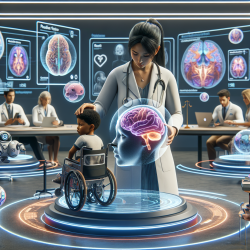Introduction
In the evolving landscape of law enforcement, addressing mental health crises effectively is paramount. The research article titled "Evaluation of Ongoing Crisis Intervention Team (CIT) Training for Law Enforcement Using the ECHO Model" provides insightful data on the benefits of continuous education for law enforcement officers (LEOs) using the ECHO model. This blog will discuss how practitioners can leverage these findings to improve their skills and outcomes when dealing with mental health crises.
Key Findings from the Research
The research evaluated 113 weekly CIT ECHO sessions held between 2017 and 2020. The sessions aimed to provide continuous education on CIT best practices to LEOs. The findings were significant:
- LEOs reported increased knowledge of CIT principles and community resources.
- Participants felt more comfortable applying learned content on the job.
- Positive attitudinal shifts towards individuals with mental illness were observed.
Implementing CIT ECHO Outcomes
Practitioners can use these findings to enhance their skills in several ways:
1. Continuous Education
Unlike traditional one-time CIT training, the ECHO model offers ongoing learning opportunities. Practitioners should seek out or advocate for continuous education programs similar to CIT ECHO to keep their knowledge and skills up-to-date.
2. Leveraging Technology
The use of videoconferencing in CIT ECHO allows for flexible participation. Practitioners should embrace technology to facilitate continuous learning and real-time case discussions, which can enhance their ability to handle complex mental health crises.
3. Focusing on Self-Efficacy
The research showed that participants felt more confident in their abilities to interact with individuals in mental health crises. Practitioners should focus on building self-efficacy through continuous practice and feedback from experts.
4. Attitudinal Shifts
Positive changes in attitudes towards individuals with mental illness were a significant outcome of CIT ECHO. Practitioners should engage in training that not only provides knowledge but also addresses and reshapes attitudes towards mental health.
Encouraging Further Research
While the findings are promising, further research is essential to understand the long-term impacts of continuous CIT training. Practitioners should participate in or support studies that explore the broader implications of CIT ECHO on community safety and mental health outcomes.
Conclusion
The CIT ECHO model demonstrates that continuous education can significantly improve LEOs' skills and attitudes towards handling mental health crises. Practitioners should leverage these insights to enhance their practice and advocate for ongoing training programs. For a deeper dive into the research, you can read the original paper by following this link: Evaluation of Ongoing Crisis Intervention Team (CIT) Training for Law Enforcement Using the ECHO Model.










